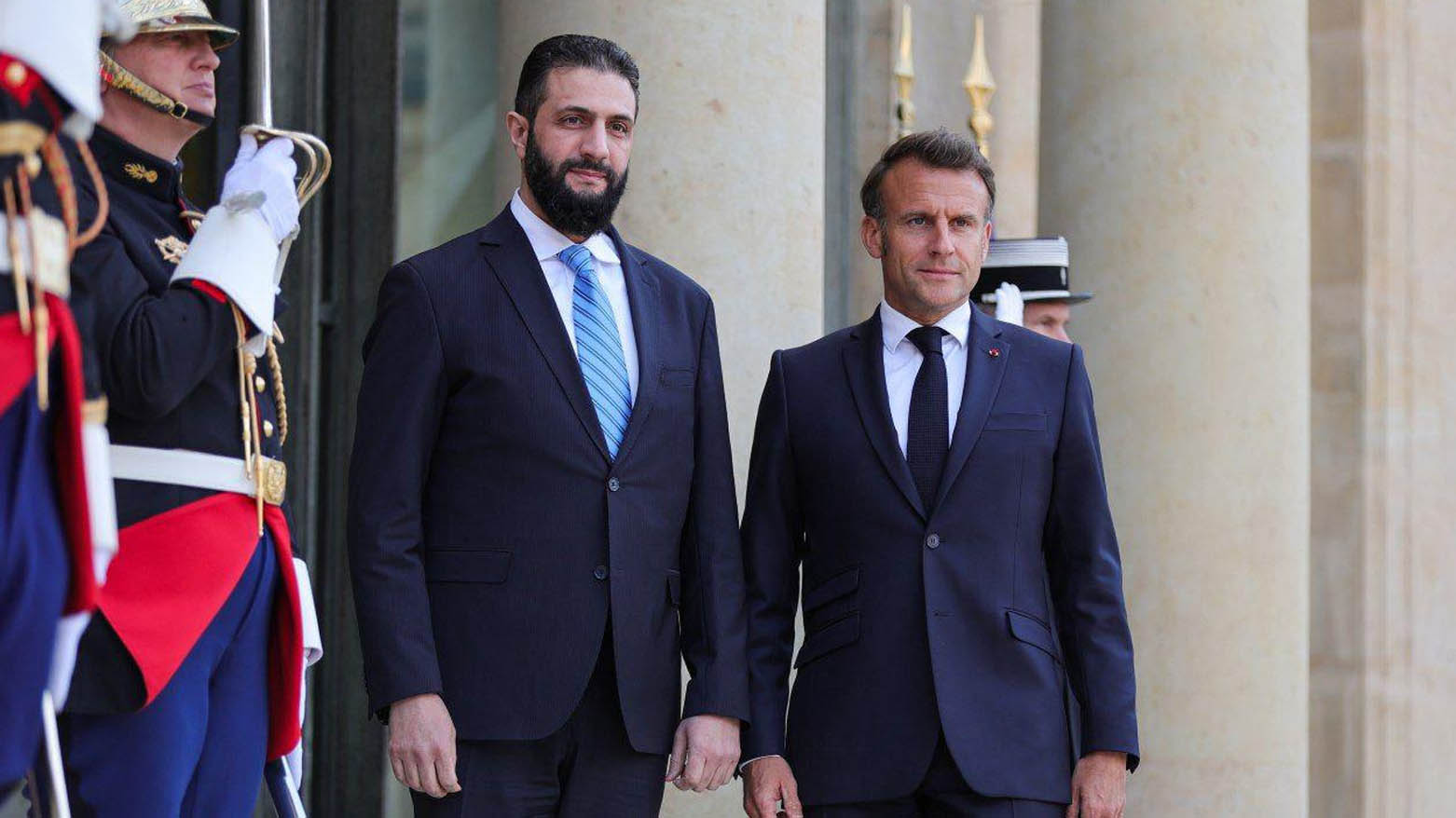Macron Backs Cooperation Between Syria and SDF Against ISIS
French President Emmanuel Macron has pledged unwavering support for the Syrian Kurds, vowing never to abandon them and he also expressed confidence in the March 10 agreement between Damascus and the SDF, describing it as “a significant moment."

By Ahora Qadi
ERBIL (Kurdistan24) – In a joint press conference held in Paris on Wednesday, French President Emmanuel Macron and Syria’s transitional president Ahmed al-Sharaa underscored a shared vision for rebuilding a post-Assad Syria, strengthening counterterrorism cooperation, and advancing transitional justice. Macron notably encouraged collaboration with the Syrian Democratic Forces (SDF), calling them “a remarkable partner in the global coalition against ISIS.”
France Affirms Commitment to Syrian People, Transitional Justice
President Macron began by reaffirming France’s longstanding relationship with Syria, one rooted in historic ties and unwavering solidarity with the Syrian people since the 2011 uprising.
He also emphasized France’s refusal to engage with the Assad regime despite participating in the international campaign against ISIS.
Macron highlighted France’s role in hosting the Caesar photo exhibition and the January 3 visit to Damascus by French and German foreign ministers—steps he said demonstrated Europe’s evolving engagement with Syria’s transitional authorities. He praised the transitional government’s efforts to address sectarian violence, particularly recent unrest in Druze and Alawite communities along the Syrian coast.
“In early March, over 1,600 Alawites and hundreds of Druze civilians were killed in sectarian strife. We discussed these unacceptable tragedies, and I reminded President al-Sharaa of the need to ensure equal protection for all Syrians, regardless of religion, belief, or political stance.”
Endorsement of SDF Partnership and March 10 Agreement
French President Emmanuel Macron has pledged unwavering support for the Syrian Kurds, vowing never to abandon them and he also expressed confidence in the March 10 agreement between Damascus and the SDF, describing it as “a significant moment that demonstrates Syria’s capacity to build inclusive national relations.” He urged the full implementation of the accord and emphasized that the international community, including the United States, should work in concert to combat the enduring threat of ISIS.
“I told President al-Sharaa that he can rely on the SDF in our joint efforts to defeat ISIS. They have been an exceptional partner in this fight,” Macron said. He vowed that France would assist Syria’s transitional leadership in ensuring that the country does not become a haven for terrorist groups, and signaled openness to gradually lifting European sanctions in parallel with progress on human rights and accountability.
Macron also voiced France’s readiness to facilitate dialogue between Syria and neighboring countries, including Israel and Lebanon, particularly in curbing Hezbollah’s influence and Iran’s regional proxies.
Al-Sharaa: Syria’s Transition Anchored in Accountability and Stability
Transitional President Ahmed al-Sharaa welcomed France’s consistent stance, praising its early investment in humanitarian, political, and justice-related efforts. “France ensured the pain of Syrians was neither erased nor forgotten. We deeply value this principled engagement,” he said.
Al-Sharaa revealed that his talks with President Macron focused on joint avenues for security, reconstruction, sustainable development, and judicial accountability. He detailed the recent challenges facing Syria, including destabilizing efforts by remnants of the Assad regime.
“Armed elements sought to exploit the fragile security context to ignite conflict. Disinformation networks exacerbated the situation with violent narratives,” al-Sharaa said. “In response, we acted swiftly—arresting lawbreakers and forming two committees: one to investigate the incidents and another to restore civil peace.”
He noted that the UN Human Rights Council unanimously recognized these efforts, and the International Commission of Inquiry on Syria lauded Damascus’s full cooperation.
Fighting Extremism, Drugs, and Border Threats
Al-Sharaa reiterated Syria’s commitment to counterterrorism, including cooperation with France and the international community. “Terrorism is a global threat, and Syria is a responsible partner in confronting it,” he declared.
Addressing the regional drug crisis, al-Sharaa said Syria has proven itself a serious actor against the illicit Captagon trade—a legacy of the Assad regime. He also highlighted continued cooperation with the Organisation for the Prohibition of Chemical Weapons (OPCW), noting that the agency commended Syria’s transparency during multiple inspections.
Al-Sharaa acknowledged We also discussed cooperation in combating terrorist organizations on Syrian soil, assessing France's contribution in this regard, and considering new frameworks for international support and he said that the fight against terrorism is a global responsibility.
Turning to regional tensions, al-Sharaa condemned recent Israeli airstrikes, which he said have intensified, killing four civilians and injuring six in just the past week. “Israel has conducted over twenty attacks in recent days under the pretext of protecting minorities. This aggression undermines regional stability.”
Rebuilding a Nation Through International Partnership
The two leaders concluded with a forward-looking vision for reconstruction and national reconciliation. Al-Sharaa expressed hope that France would contribute to rebuilding war-torn Syrian cities and towns, signaling Syria’s readiness to emerge as a peaceful and cooperative regional actor.
